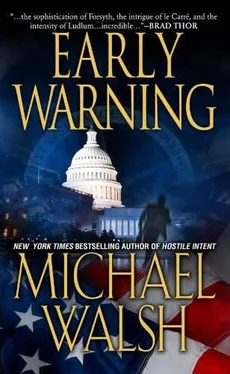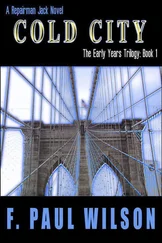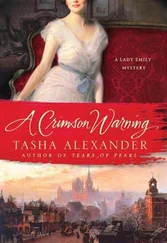Michael Walsh - Early Warning
Здесь есть возможность читать онлайн «Michael Walsh - Early Warning» весь текст электронной книги совершенно бесплатно (целиком полную версию без сокращений). В некоторых случаях можно слушать аудио, скачать через торрент в формате fb2 и присутствует краткое содержание. Жанр: Триллер, на английском языке. Описание произведения, (предисловие) а так же отзывы посетителей доступны на портале библиотеки ЛибКат.
- Название:Early Warning
- Автор:
- Жанр:
- Год:неизвестен
- ISBN:нет данных
- Рейтинг книги:3 / 5. Голосов: 1
-
Избранное:Добавить в избранное
- Отзывы:
-
Ваша оценка:
- 60
- 1
- 2
- 3
- 4
- 5
Early Warning: краткое содержание, описание и аннотация
Предлагаем к чтению аннотацию, описание, краткое содержание или предисловие (зависит от того, что написал сам автор книги «Early Warning»). Если вы не нашли необходимую информацию о книге — напишите в комментариях, мы постараемся отыскать её.
Early Warning — читать онлайн бесплатно полную книгу (весь текст) целиком
Ниже представлен текст книги, разбитый по страницам. Система сохранения места последней прочитанной страницы, позволяет с удобством читать онлайн бесплатно книгу «Early Warning», без необходимости каждый раз заново искать на чём Вы остановились. Поставьте закладку, и сможете в любой момент перейти на страницу, на которой закончили чтение.
Интервал:
Закладка:
In the end, of course, none of that really mattered to Devlin. He had a job to do, and he was going to do it or die trying. The weightier issues of state were best left to the men and women to whom they were assigned, however inept or unqualified they might be; the decisions he made in the field were tactical, not strategic. His failure to kill Skorzeny when he had the man in his grasp in Clairvaux was something he was going to have to live with, and Devlin had not the slightest doubt in his mind that whatever soup he was about to walk into had something to do with that failure. Emanuel Skorzeny was a sick, twisted individual animated in equal parts by greed and hatred, and he would continue his atheist’s war against God and civilization until the day somebody proved to him the reality of Hell.
They were swarming now, the enemies of America. For decades, maybe even centuries, they had lain in wait, hoping to take down the country and the civilizational ethos it represented. They had attacked from within and without. They had sent infiltrators disguised as philosophers, as artists, as educators, as clergymen, as patriots, and, the worst, as lawyers to manipulate the system, bore in, and hollow it out. They had created a mind-set by which up was down, black was white, and in was out. They had called into question every tenet of the American experiment and posited that it was illegitimate and inimical. They had used the failures of other societies as proof of the malfeasance of the American society. And now their handiwork lay all around him-the smoking rubble of Times Square.
And yet Devlin welcomed this challenge. Not solely for the thrill of the fight-that was a given. With his ticket out already punched, he could leave the fray whenever he wanted and, in the aftermath of Edwardsville, he had thought to depart and take Seelye down with him. But she had changed all that.
But his welcoming of the challenge had roots far deeper. Devlin engaged because by the very act of engaging, he was proclaiming the best of American values. Most of the time, the debate over the soul and the future of the country came where it properly belonged, in the classrooms, in Congress, in the newspapers and the blogosphere, and on the political stump. But war was politics by other means, and so when it came to that, as Jefferson knew it must, it had to be fought with the same passionate ferocity. As Al Capone famously said, “in my neighborhood you get farther with a kind word and a gun than with just a kind word.” The problem had been that, since the end of World War II, the poison had seeped into the body politic, Schopenhauer’s Wille zur Macht had been delegitimized as the intellectually and morally absurd doctrine of “proportionate” response had gained first a toe-hold, then a foothold and finally had become, if not accepted doctrine among war-fighters, then at least the media-fueled template that framed the issue and thus limited discussion.
All of this could be argued in the pages of one of Jake Sinclair’s newspapers. Devlin was prepared to argue it where the argument properly belonged: on the battlefield. Manhattan was now a petri dish of political pathology, a lab experiment into which he had now injected himself.
He stepped over some rubble and looked around. He was in the remains of what had once been a legit theater, but was now a heap of rubble. He ducked down behind a collapsed wall, popped open his netbook, and got a read on the situation. Using an advance logarithm that screened out legit subscribers, emergency workers, and governmental accounts from possible rogues, he counted thirteen separate suspicious entities in use within a ten-block radius. He wouldn’t have to take them all out-the cops would take care of some of them-so he would start with the most difficult targets, the ones whose locations made them feel the most secure, and make an example out of them. Against these adversaries, there was nothing like a head on a pike to focus their attention on what was about to happen to them.
CHAPTER TWENTY-SIX
Midtown Manhattan
Alexander Stegmaier had never heard of Minsky’s, nor seen the movie about the famous raid, nor had any appreciation at all of the famous burlesque house, so the irony of the fact that he was standing inside the New Victory Theater on 42nd Street, which had once proudly been the Republic and the flagship of the Minsky empire, was completely lost on him. He wasn’t interested in naked women, except in the up-close-and-personal, but as he had no experience with the strange and exotic species, it was all theoretical.
Never mind. He was standing in the heart of the modern Gomorrah, the city of such wicked depravity that the Brothers had not stopped trying to take it down, and never would until it was leveled. The city that once gloried in its sinfulness, latterly become a home to “family entertainment,” as if that would save it from God’s wrath. This vile cesspool, from which was he was even now picking off pedestrians from his perch in the second-story window.
Alex Stegmaier was not a Muslim and would have been horrified at the thought. His alliance with the Brothers was pragmatic, not religious, but since the enemy of my enemy is my friend, it was not hard for them to make common cause, at least temporarily, until such time as the apocalypse was well and truly summoned, after which it was up to beings far greater than himself to sort out the final conflict. His job was to bring it on.
At first, the cars had been his primary targets. It was so satisfying to pull the trigger, hear the glass shatter, and watch the effects as the car veered, accelerated, or simply stopped, depending on whether his bullet had found a home in flesh or metal. It was not that he was a crack shot exactly, but his periods of training in Oregon, in the mosques of Dearborn, and in the encampments in upstate New York had given him a self-confidence that he had always lacked back home in Marin County, California. There, he had always been a misfit, a nerd, a weakling who had never been much good either at science or math, not to mention hopeless at sports. He stuttered, which left him off the debate team, and after he’d been routinely beaten by a parade of underclassmen at chess, he’d stopped competing at pretty much everything.
He leaned out the window. The main action lay to the east, but the west was a target-rich environment of cop cars and emergency vehicles, clustered around the Eighth Avenue intersection. He looked through his 8x-power scope and found an unmarked vehicle, overturned. A man was trying to drag another man, obviously wounded, out of the wrecked car. Alex decided that they would be good target practice and was lining up a shot when his cell phone rang.
Damn!
He lowered his sights and glanced at the caller ID: Control. He didn’t know Control’s name, but that was what they all called him, all of the brave warriors on the operation, whose names and real identities were unknown to each other and known only to him. Control was as close as he ever hoped to get to God in this life.
“Tammy.” That was his code name, for Mount Tamalpais, the sleeping Indian maiden turned into a mountain that dominated Marin County, across the Golden Gate from San Francisco. It was a girl’s name, and he resented it a little, but he was not about to let on about that now. Not in the middle of the most glorious moments of his life.
“Where are you?” The man had a slight foreign accent, although being a Californian, almost everybody sounded foreign to Alex.
“Base One,” he replied. “Neuer Sieg.” He liked to show off his knowledge of German, because he thought it made him sound more threatening; even if the grammar and the cases more often than not defeated him.
“Good. Hold in place, but get ready to fall back, to the east. A great vision of glory awaits you.”
Читать дальшеИнтервал:
Закладка:
Похожие книги на «Early Warning»
Представляем Вашему вниманию похожие книги на «Early Warning» списком для выбора. Мы отобрали схожую по названию и смыслу литературу в надежде предоставить читателям больше вариантов отыскать новые, интересные, ещё непрочитанные произведения.
Обсуждение, отзывы о книге «Early Warning» и просто собственные мнения читателей. Оставьте ваши комментарии, напишите, что Вы думаете о произведении, его смысле или главных героях. Укажите что конкретно понравилось, а что нет, и почему Вы так считаете.












